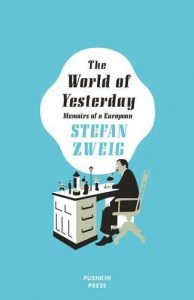A dream Europe
[This is not a relevant report for this blog, but an irresistible one]
The book “The world of Yesterday” of Stefan Zweig and the eponymous play by Patrick Pineau and Jérôme Kircher
This is not only a story of the European fall. Stefan Zweig inspires us also about the beauty of the continent without denying the need of political commitment.
Through Zweig’s eyes Europe was wonderful. Being European was such a great personal pleasure. Being European meant travel, meet people, marvel, learn and grow. Young Europeans had the possibility to “experiment the world”. Zweig looked for freedom in Berlin and Paris and also for eagerness, joy, a light life filled with culture and poetry. He reached Switzerland and England for peace. He tried to find in European countries what he could not find in Vienna, the person he could not be, the artists he admired, the political environment he needed. Europe seems to have allowed him to try other lives without becoming a stranger. He could analyse and value the persons, famous authors as unknown citizens, he met on his way. He looked for artistic food, external strength. Zweig entered Europe through literature, music, history and fine arts. He could access European culture sitting at any café table in Vienna like in a “democratic club”. He was a keen observer of his time, a glorious euroreporter.
Zweig addressed as well the collective progress from which every European could benefit in the early 20th century: long-term peace, scientific discoveries and technical innovations, development of capital cities, contact with nature, practice of sport, affordable travels without border control. This progress enabled the light life he cherished. He described that time as the youth of Europe built on confidence, consciousness, proud and international solidarity. Zweig therefore developed a unique sharing and working community through several countries. That European brotherhood allowed him to resist the call to battle.
Zweig did not completely glorify the society of that time even before the First World War: young people did not have any moral freedom or any political and professional power. Starting at school, children were taught submission as in prison and should find alternative places to quench their curiosity. Later in the Austrian society, they will only meet other social classes in artistic and public celebrations. Even at the European level, Zweig addressed fundamental differences between countries, especially between Austria and Germany.
He further considered that the new powers of European nations led to imperialism. A collective thinking of potential risks was missing to optimistic populations and elites. The First World War has deeply discredited political and military authorities which manipulated public mind, incited hatred and did not make way for lasting peace.
Zweig was a favoured writer and his life did not look like every European’s one. Besides he was not politically active and did not thus take part to the building of an institutional Europe. Aware of his powerlessness, he however always claimed his beliefs in writing and pacifist communities. And he opened us a window on the lucky Europe he met, a possible Europe to look for.
If you want to see, what a European life could be, take a break, read Zweig’s travel guide.
